Mrimaumri: Difference between revisions
| Line 151: | Line 151: | ||
I have an idea of how to establish the vocabulary. The time consuming thing is allocation. I lately heard about reverse sound from the vocabulary from other natlangs. I will not only reverse, reversing only gives the inspiration, then I put the first word drafts in my alphabet and grammatical system. | I have an idea of how to establish the vocabulary. The time consuming thing is allocation. I lately heard about reverse sound from the vocabulary from other natlangs. I will not only reverse, reversing only gives the inspiration, then I put the first word drafts in my alphabet and grammatical system. | ||
[[File:Alphabet1.jpg|framed|left]] | [[File:Alphabet1.jpg|framed|left]] | ||
| Line 162: | Line 162: | ||
[[File:Alphabet4.jpg|framed|center]] | [[File:Alphabet4.jpg|framed|center]] | ||
[[File:Alphabet5.jpg|framed|center]] | |||
[[File:Word ending consonants.png|framed|center]] | [[File:Word ending consonants.png|framed|center]] | ||
==dictionary== | ==dictionary== | ||
Revision as of 17:38, 11 June 2016
1. Mrimaumri is a conlang created by the idea to make a language that has pretty sounds for singing songs. It should be smooth. It contains some rare consonant combinations and the use of the german diphtong "au" is the Erkennungsmerkmal. The grammar should be simple and unique. The language is not complete yet. It is open to changes to make the sound prettier.
2. Mrimaumri is a language of a conworld. The world is like a aviation world. Because of the spoilt poisoned soil people live on flying steel islands. The people also speak many rare natlangs and mixes of them. For example german and Japanese are more widespread than in the actual world. English is not dominant in this world. Language used in the conworld change and develop quickly. No one knows how mrimaumri rose. The inhabitants of the world are able to speak and learn many languages. That's the reason why no one knows on which influence mrimaumri rose. There is no inventor at all.
Introduction
Phonology
Orthography
Consonants
Vowels
Prosody
Stress
Intonation
Phonotactics
Morphophonology
Morphology
Syntax
Constituent order
Noun phrase
Verb phrase
Sentence phrase
Dependent clauses
Example texts
Übersetzung von Songtexten Eisblumen von Eisblumen
Der Tag flieht eilig aus der Stadt – ljuh djuhg wihn fjuhih lohluh gwihdih
Sie trinkt sich an den Schatten satt – eh’ah mihfih wruhg päi gluhrih‘el
Und gibt ihr wahres Antlitz preis – deh’uh tmaugihmoht chyu wrehda tabjuhd
Die Pfützen schimmern schon wie Eis – eh’ah laschel fjuhdaun gxad tahs ais
Am Himmel glänzt ein Silberstreif – päi draun njuhn nel rihnautaisch
Der Abend wandelt Tau zu Reif – ljuh fjahd djis djuhm suh duhl
Die Bleichheit die von unseren Wangen schneit – eh’ah tamraudehk guh nihs nuh chyihmel naisch
macht uns wie Engel schön – muchxao nuh bel tahs gmow’el (äl like in Fell)
Sie sollten auf die Knie gehen – täilm golsd mow mäi bih’el
und beten das der Mond verhangen bleibt - deh’uh bäig wähd ljuh luhn schtäig bruhg
Wir sind wie Eisblumen – nuh srarn tahs aisflöhmel
Wir blühen in der Nacht – nuh bluhsch öiluh chxraibowg
Wir sind wie Eisblumen - nuh srarn tahs aisflöhmel
Viel zu schön für den Tag – fjeh suh bel puhluhsch djuhg
Wir sind wie Eisblumen - nuh srarn tahs aisflöhmel
Kalt und schwarz ist unsere Nacht – draud deh’ah zahsch -----lis(lihs/slihsch) nuh mrähn (draudeazasch lisnuhmrähn)
Eisblumen blühen in der Nacht – aisflöhmel bluhsch öiluh chxraibowg (alternative: chrahboog)
Der Morgen wandelt Reif zu Tau – ljuh matah djis duhl suh djuhm
Der Tag macht alles grell und rau – ljuh djuhg muchxao tuh’ahn mri’ah deh’uh ehsch
Wir kleiden uns in Traurigkeit – nuh flächy nuh öils glaomrih
Doch geht der Tag und unsere Zeit – fil ljuh djuhg telaht deh’uh nuh glaisch
Wer leuchten Will, der fleht das Licht – bruhs woals schowg, ljuh wihn ljuh bjehm,
Der schaut der Nacht ins Angesicht – ljuh ohsd ljuh chxraibowg öiluh belmrihd
Die Bleichheit die von unseren Wangen schneit – eh’ah tamraudeht guh nihs nuh chyihmel naisch
Macht uns wie Engel schön – muchxao uh bel tahs gmowel
Sie werden auf die Knie gehen – täilm gao mow mäi bih’el
Und beten das der Mond verhangen bleibt – deh’uh bäig wähd ljuh luhn schtäig bruhg
Wir sind wie Eisblumen ¬- nuh srarn tahs aisflöhmel
Wir blühen in der Nacht - nuh bluhsch öiluh chxraibowg
Wir sind wie Eisblumen - nuh srarn tahs aisflöhmel
Viel zu schön für den Tag fjeh suh bel puhluhsch djuhg
Wir sind wie Eisblumen - nuh srarn tahs aisflöhmel
Kalt und schwarz ist unsere Nacht – draud deh’ah zahsch lis nuh mrähn
Eisblumen blühen in der Nacht – draud deh’ah zahsch lis nuh mrähn
Eisblumen - aisflöhmel
Wir sind wie Eisblumen - nuh srarn tahs aisflöhmel
Viel zu schön – fjeh suh bel
Wir sind wie Eisblumen - nuh srarn tahs aisflöhmel
Wir sind wie Eisblumen - nuh srarn tahs aisflöhmel
Wir blühen in der Nacht - nuh bluhsch öiluh chxraibowg
Wir sind wie Eisblumen - nuh srarn tahs aisflöhmel
Viel zu schön – fjeh suh bel
Wir sind wie Eisblumen - nuh srarn tahs aisflöhmel
Kalt und schwarz ist unsere Nacht - draud deh’ah zahsch lis nuh mrähn
Eisblumen blühen in der Nacht - aisflöhmel bluhsch öiluh chxraibowg
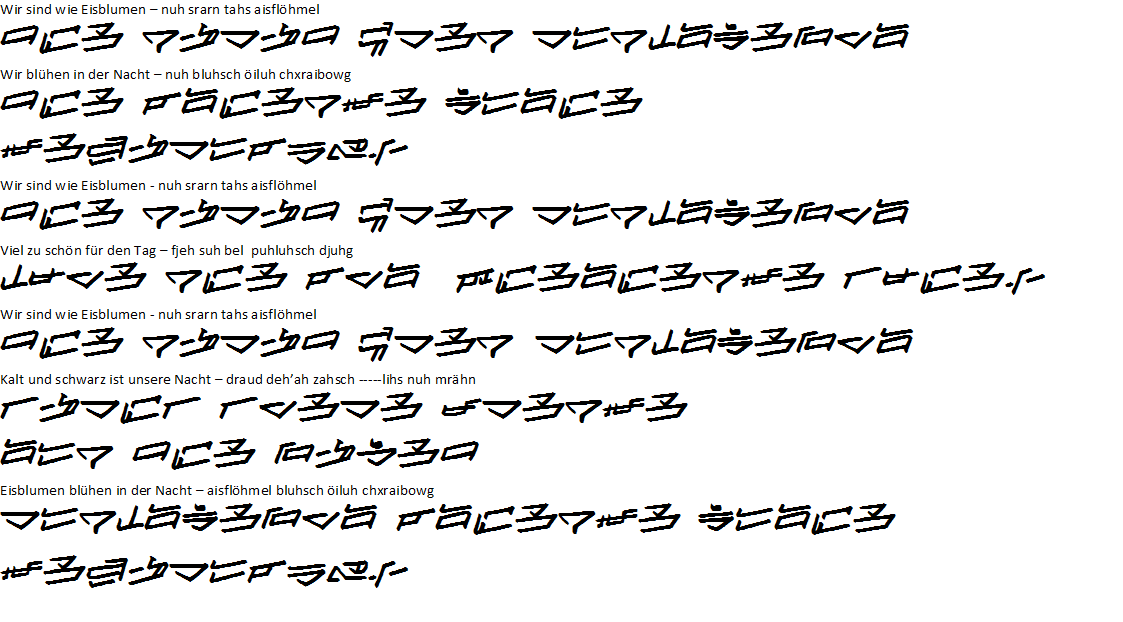
Other resources
alphabet
I made a syllable alphabet of 912 syllables. I used a conscript like hangeul to quickly have characters for all syllables. I wanted to know how much one and two syllable words can be constructed from the 912 syllables. That should be 912 one syllable words and 912*912 two syllable word. That should be a great variety of words.
I have an idea of how to establish the vocabulary. The time consuming thing is allocation. I lately heard about reverse sound from the vocabulary from other natlangs. I will not only reverse, reversing only gives the inspiration, then I put the first word drafts in my alphabet and grammatical system.
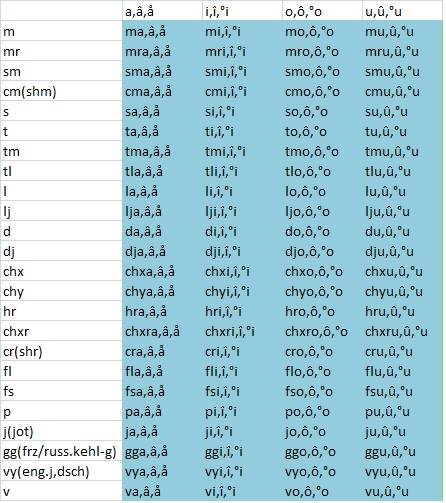
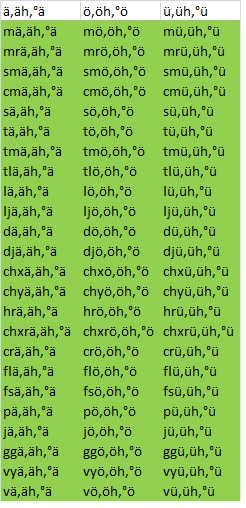
the green coloured syllables are rarely used
the blue ones and the violett ones are often used
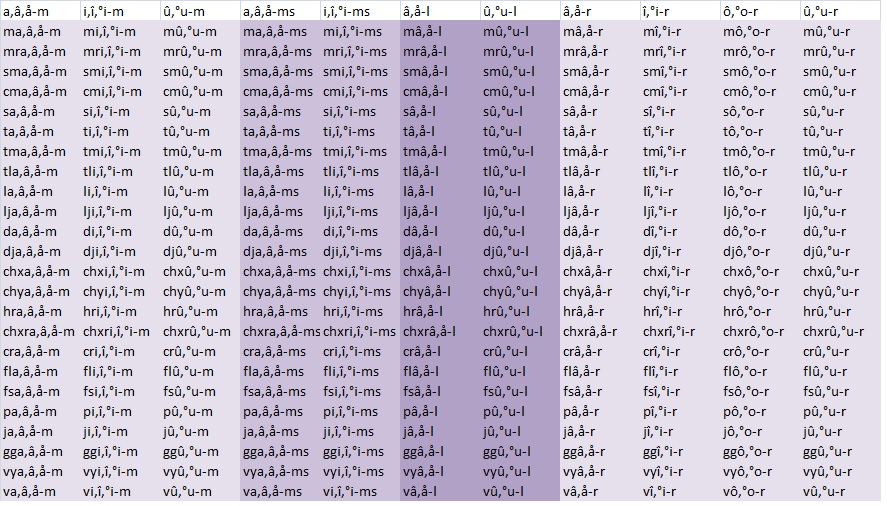
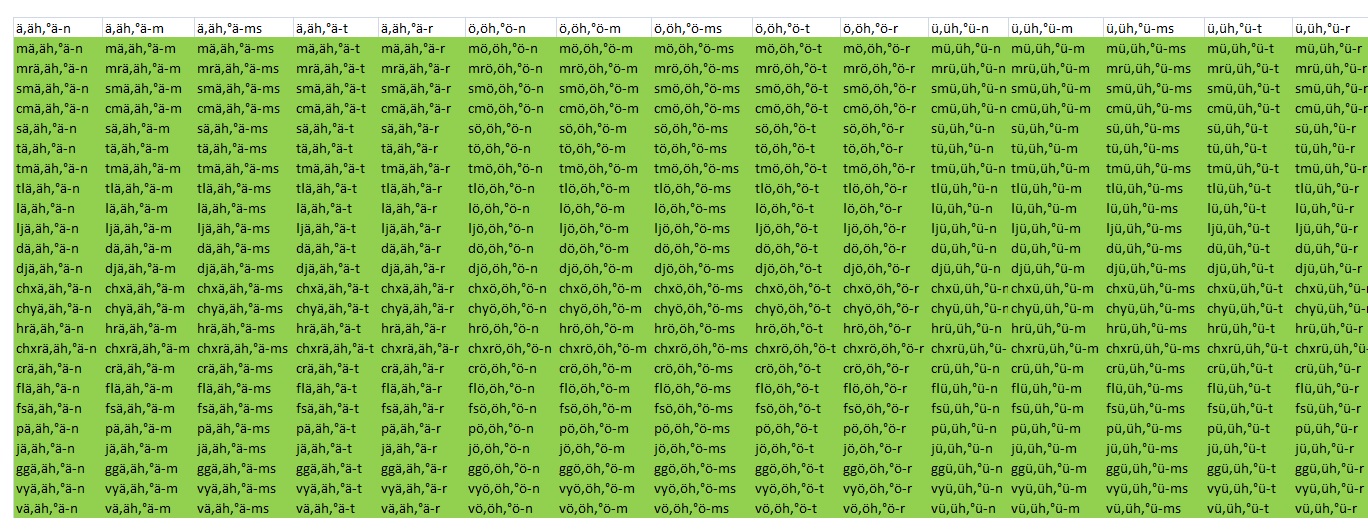
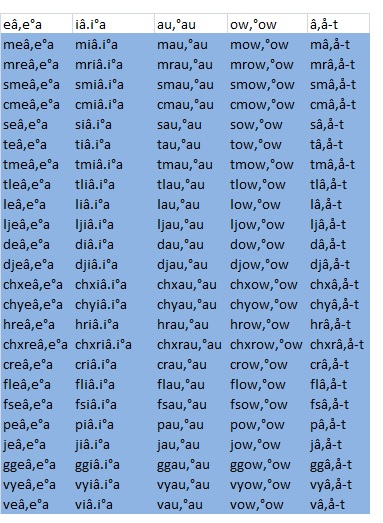

dictionary
pronouns
in subject
Singular
ral - I - ich
kôr - you - du
rî - er - he
zîa - she - sie
lörd - it - es
Plural
nû - we - wir
kôr - you (all) - ihr
täilm - they - sie
article
male article: ljû – the(male) - der, dieser, welcher;
female article: diâr – the(female) - die, diese, welche;
structure words
dîjû – and – und
sû - to - zu
öils - in - in
tâs – like - wie
lûf – full - voll
verbs
sû svân, srarn, lis/slic – to be – sein
sû mraik, mrowg – to like – mögen
sû fên, pentalêm – to think – denken
sû aulbîr – to believe – glauben
sû klemê – to understand – verstehen
sû êdel – to help – helfen
sû rörn – to learn – lernen
sû chxörnrê – to teach – lehren, unterrichten
sû chyîd – to need – brauchen
sû taunechy – to use – (be)nutzen
sû îs – eat – essen
sû mîfî – drink - trinken
sû kapt – to catch – fangen
sû wîn – to flee - fliehen
sû lemôs – to give – geben
sû mênd – to take – nehmen
nouns
adjective to noun: add dêk
verb to nound: add gî
noun to verb: both have the same form
Plural: add "as" or "el", depends on the ending of the noun
ljû mêsa/mêsas – the house/houses
diâr nûl/nûlel – the door/doors
diâr maumri/maumri’el – the language/languages
ljû djûg/djûgel - the day/days
diâr chxraibowg/chxraibowgel - the night/nights
ljû dâl/dâlel, lald/laldel - the boy/boys
diâr calûa/calûas - the girl/girls, daughter/daughters